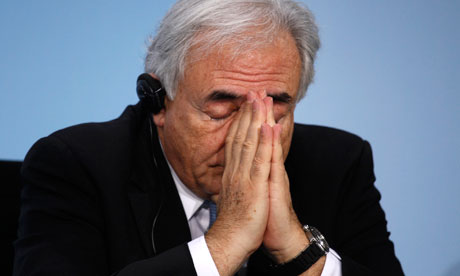The IMF must move with the economic times
To replace Dominique Strauss-Kahn, the IMF should look to China or India to reflect the tilt in the axis of growth


Dominique Strauss-Kahn in Berlin last year. His arrest came at a crucial time for the IMF – during talks for a new Greek bailout. Photograph: Tobias Schwarz/Reuters
The allegations against Dominique Strauss-Kahn have highlighted some of the worst facets of British journalism. Some newspapers have simply ignored the story, presumably on the grounds that the International Monetary Fund is a faraway body of which we know little, while the former broadsheets have tended to revel in the mix of high finance and "high jinks", even though the incident involves a charge of a serious sexual crime.
The background coverage of the role of the IMF is equally unedifying, with the televised detention of the IMF chief seemingly just an interruption to the process of agreeing another bailout for Greece. The IMF was holding its latest biannual meeting with representatives of 187 countries, which registered further snail-like towards recognising the shifting economic balance of power in the world economy.
The fund had previously agreed to double its capital (or quotas) to $756bn, and a series of fast-growing countries led by China and India are increasing their quota to partially reflect their increased weight in the world economy. This is at the expense of the much slower economies of the old G7 grouping, including the US, Japan, Germany, France, Britain, Italy and Canada, who see their quota and voting power reduced.
There has also been a gradual breakdown in the so-called Washington Consensus, which was supported by the IMF, the World Bank and the US treasury department. This has been a crusading ideology, championing an end to capital controls and in favour of lower state spending, privatisations and reduced pay and living standards to bolster competition.
The repeated and disastrous failures of these policies in Africa, Asia and Latin America did little to dent the ideology until the costly default of Argentina in 2002. As the whole preceding period had been an exercise in implementing Washington Consensus economics, there was nobody else to blame when it failed so spectacularly and drove Argentina into bankruptcy.
This was echoed in the recent crisis in all the western economies. Not only did the IMF fail to foresee the biggest economic crisis since the depression of the 1930s, but also its own shibboleths of deregulation, free movement of capital and reduced taxes and government spending contributed to it.
Temporarily, at least, most western governments abandoned these failed nostrums simply to avert economic catastrophe. The IMF has shifted uncomfortably to adapt to the new situation, even boasting in one recent publication that "we have worked closely with governments to protect and even extend social spending".
Elsewhere, authoritative IMF research has shown both howcounterproductive government spending cuts will be and how increased government investment provides the answer to the economic crisis
All information on this website is for educational purposes only and is not intended to provide financial advise. Any statements about profits or income, expressed or implied, does not represent a guarantee. Your actual trading may result in losses as no trading system is guaranteed. You accept full responsibilities for your actions, trades, profit or loss, and agree to hold MinKL Invest harmless in any and all ways.
No comments:
Post a Comment